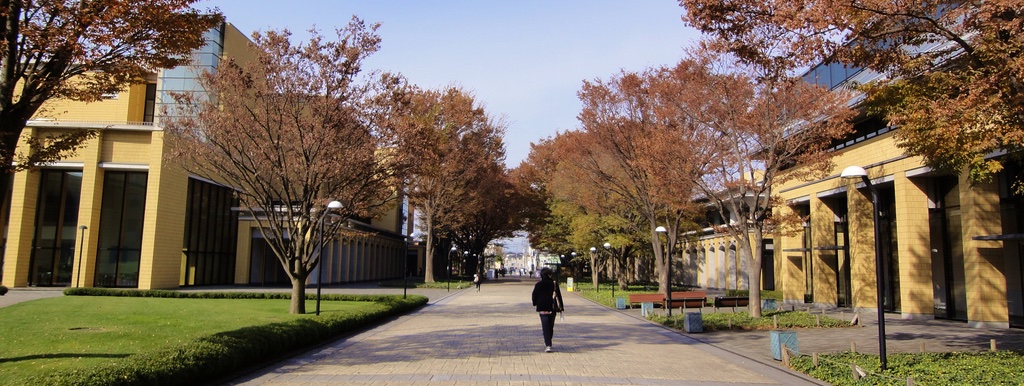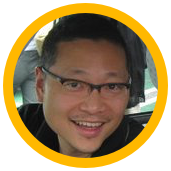
Studying in Japan
Studying in Japan
QR Link
Preparation
Transcript
José Cruz: Ahh just going on (Yeah) to the Japanese then. What brought you to Japan?
Danny Minn: Uh, so when I was in college, I I took some Japanese classes and then I thought wow this is really interesting, Uh it was easy for me, maybe I had that- the ear for it because of my time in uh Okinawa, you know watching Japanese tv (Mm mm) and uh, I saw this opportunity to go on an exchange program in Tokyo (Mm-hmm) and that was it, I said, alright let’s do itan expression meaning something like, “Let’s go!” or, “Let me try my best.” (0:35). And… becausea colloquial pronunciation that sounds like “KUHZ”, sometimes written as ‘cuz. (0:36) I knew that if I went I would get all the credits. They would transfer (Sure and) this would help me graduate also.
José: Get your degree, yeah yeah.
Danny: So I went to Tokyo, Aoyama Gakuin DaigakuJapanese for “university” (0:45). (Really) And that was it, it was just…
José: So you ended up taking most of your credits in Japan and just graduating from, what um, if I may ask, what university were you attending in America? (Portland State University) OK you were at uh, Portland State…
Danny: That was a one year program at Aoyama Gakuin.
José: Ah OK, so you got one year’s worth of credits, brought them back to America, graduated, couldn’t get enough and came back to Japan? Is that the..
Danny: Yeah right. Then, you know, after a year of Japanese under my belt, I thought, oh OK, I can speak but I want to you know, get to a higher level. (Mm-hmm) So (Mm-hmm) I wanted to go to graduate school.
José: Wow. You took all of those classes at Aoyama- I’m sorry, AOYama? (Right) You took all of those classes at Aoyama in Japanese?
Danny: No becausepronounced “KUHZ” (1:35) I- I couldn’t speak Japanese well enough, (Oh OK) so they had several classes that were in English, uh yeah.
José: But when you went to graduate school (yeah) that had to have been all in Japanese.
Danny: That was all Japanese, yeah.
José: How did youdid you: pronounced “DJU” (1:48) -was it a, a bit of a big hurdle for you, bigger hurdle maybe? Or maybe easier than you imagined? Doing all (They gave) of your graduate work in Japanese.
Danny: They gave- they gave me two years to get my Japanese level up, (Ah) rightsome people have a habit of tagging sentences with “right” with an upward inflection so it sounds like a question. (2:03)? I took a lot of Japanese language courses (You went) yeah.
José: You went whole hogan expression roughly meaning, “completely/totally” (2:07) into just studying Japanese for a bit.
Danny: Right and then I took the entrance exam to get into the graduate program (Uh-huh) and I became a graduate student and that was another two years.
José: Wow, and so um just again for the recordan idiom meaning something like, “please give true official information” (2:20), how old are you now Danny? (Oh) Come on come on, spit it outmeaning “say it” when someone is being hesitant about saying something (2:24), don’t be like that. (44) 44 and this, uh the graduate degree was I guess what maybe about 15 years ago, ten years ago?
Danny: Yeah yeah, uh twe-13 years ago, yeah.
José: 13 years ago. Wow, great. And you got your degree and still decided to stay in Japan, never went back to America to live for any extended period?
Danny: Right. I just stayed. I worked in Tokyo for a few years. and then I thought, well, I’d rather work at a university, (Mm-hmm) so…
José: Well, you’re working at one now. Is this your first um, university gig?
Danny: That’s right, yeah. (Really) So when I was in Tokyo I was working at NTT (Oh OK) Yeah, uh you know becausebecause: pronounced “KUHZ” (3:14) they needed bilingual people. (Uh huh) But I did not enjoy that job very much (Yeah OK, alrightyputting “-y“ at the end of certain words, (OKey-Dokey) makes them sound more casual and friendly (3:21)) So…
José: So you said, um I want to teach, you went for your first university interview and landed this jobmeans, “was hired for this job” (3:28).
Danny: That’s right.
Consolidation
QR Link
Access this article on your mobile device

Studying in Japan
Speakers

José Domingo Cruz
Canadian
Vancouver, British Columbia

Danny Minn
American
Portland, Oregon
Statistics
- words (including pause words)
- minutes in the mp3 audio
- words per minute for this article
Continue practicing your English fluency with the related posts above, or navigate to other authentic conversations using the Previous and Next buttons below.
Spritz
To spritz only part of this conversation, highlight the text you want and click the “SPRITZ NOW!” button. Clicking the button without any text highlighted will spritz the entire page.
To quickly adjust the words per minute (wpm), you can use the left and right arrow keys.
Writing comments will help your English writing skills. Feel free to ask questions and share opinions. We try to respond to all comments we get on the site. test




0 Comments